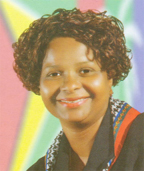– as parties wrangle over numbers
Wrangling over the numerical composition of the Public Procurement Commission is continuing to stall the nomination process.
The nomination of members of the constitutional commission was one of the agreements brokered by national stakeholders and the process had been timetabled to be completed since last July. The selection of nominees to the commission is the responsibility of the National Assembly’s Public Accounts Committee (PAC), which has been trying to complete the process since 2003.

PAC Chairperson Volda Lawrence told Stabroek News last week that the government has been holding up the process by its failure to provide the names of its nominees so that the deliberations could begin. Both the PNCR-1G and the AFC have submitted their nominees to PAC. According to Lawrence, once the nominees meet the criteria set out in the Constitution, the PAC would use a grading system to select the five most qualified nominees for appointment to the commission.
The government, she said, wants to work around the Constitution to ensure it has a majority on the commission by using a nomination process similar to that used to select parliamentary committees. “But the Constitution spells out what you have to do,” she said, noting the qualifications that need to be met to ensure the persons with the best experience in public procurement are selected. “You want people who are qualified and who have the skills,” Lawrence said, adding that, “We are looking for the cream of the crop of people, who can withstand any public scrutiny.”
Lawrence said PPP/C MP Komal Chand, who heads the government side on the PAC, has been maintaining that he cannot submit anything as it is still being worked on.
Chand declined to comment, when contacted by Stabroek News. He instead referred the newspaper to the governing party’s General Secretary Donald Ramotar, who had been a member of the PAC when the first attempt was made to complete the nomination process. Ramotar is no longer a member of the PAC and when asked he admitted that he was not aware of the new developments.
However, he explained that the method of selection has been the source of disagreement. Ramotar recalled that the PPP/C and the PNCR could not agree on any candidates during the first nominations, when each party had identified five nominees. Given the need to establish the commission as quickly as possible, Ramotar said he subsequently proposed that the ruling party in parliament should nominate three and the opposition two. “They rejected that,” he said, adding that the process did not advance much further. “I will admit that this has taken place a while ago, but I hope that this matter can be resolved as early as possible,” he said.
Meanwhile, when questioned by Stabroek News on Wednesday, Head of the Presidential Secretariat Dr Roger Luncheon admitted that there is some accuracy in the report that the government has not named its nominees. However, he said that the PAC is still working to reach consensus on the numerical composition of the commission. Luncheon further explained that while the government interprets the legislation to mean that it is supposed to have a majority, others disagree with interpretation.
The Public Procurement Commission was one of the decisions coming out of the constitutional reform process.
The Constitution empowers the commission to monitor and review all public procurement systems to ensure that they are in accordance with the law. It is to be made up of five members, who are
supposed to have “expertise and experience” in procurement, legal, financial and administrative matters.
Among the commission’s primary functions is monitoring the performance of procurement bodies for adherence to regulations and efficiency in procuring good and services and the execution of works. It specifically has oversight over the procedures of ministerial, regional and national procurement entities as well as those of project execution units.
Further, the commission is to investigate complaints from suppliers, contractors and public entities and cases of irregularities and mismanagement, with the power to propose remedial action in all instances. In this regard, the setting up of the commission and the Public Procurement Appellate Tribunal is seen as integral since there is currently no recourse for contractors who feel wronged by the selection process.
The Constitution also stipulates that the commission shall be independent, impartial and shall discharge its functions fairly.
A study by the Ethnic Relations Commission (ERC) suggested that the commission be established so that certain functions that it has to perform can be removed from the ambit of the National Procurement and Tender Administration Board (NPTAB), which was set up after the passage of the Procurement Act 2003. That study had said that the mode of creation and manner of oversight of the NPTAB is qualitatively different from those constitutionally provided for the Public Procurement Commission. Also, critics have charged that the NPTAB undermines the intended work of the commission by usurping some of its functions.
Among the most vocal advocates for the setting up of the commission has been PNCR MP and shadow finance minister Winston Murray who has accused the government of dragging its feet because it is comfortable with the Finance Ministry being the solely in control of the tender process. “This gives the government control over the procurement system,” he had said in a past interview with Stabroek News, where he said that the minister and the government were more comfortable with the persons they appoint to put on the board rather than having a commission that would be independent, impartial and that discharges its functions fairly in keeping with its constitutional mandate.
Last year, a World Bank official stressed the need for the commission to be put in place so that aggrieved participants in the procurement process could seek redress. Alejandro Cedeno, Communications Officer for Latin America and the Caribbean also said that the World Bank reminded the government here of the need to have such a body in place.





